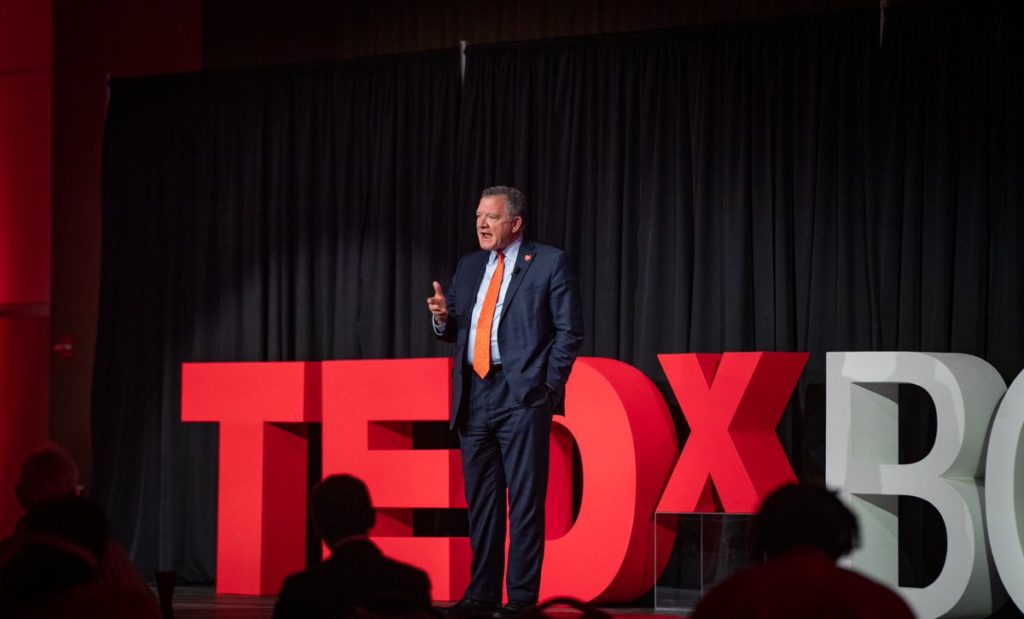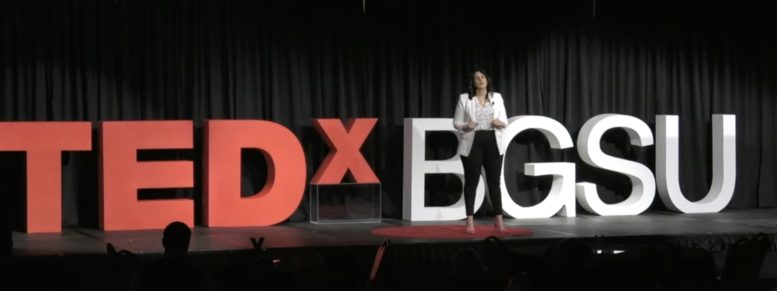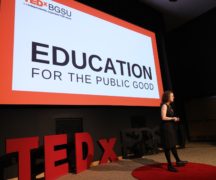By JULIE CARLE
BG Independent News
Change for a Bowling Green clinical psychologist was found in a defining moment as a 13-year-old.
Advocacy for a senior international business and supply chain management student meant encouraging others to take on the role of global citizens.
A social work graduate student was able to grow from being a child scarred by sexual abuse to a woman who learned to cast off the years of shame associated with the stigma of abuse.
An art history student realized the impact local art conservation could have on a community’s sense of identity.
Coining a new term helped give voice to a transwoman on her journey to support the transition of others.
The power of higher education was personal for a university president who now regularly sees the impact of innovations for creating public good.
These were some of the 23 stories told during Bowling Green State University’s independently organized TEDx event Wednesday. At the core of each story was the underpinning of public good gained through advocacy, change, community, growth or innovation.
Hosted by the university’s C. Raymond Marvin Center for Student Leadership and Civic Engagement, TEDxBGSU offered a platform to amplify the voices of students, faculty, staff, and community members who shared new ideas, inspire change and foster ideas worth spreading. In between each of the five sessions was time for speakers and audience members to come together for conversations and the exchange of ideas.
Fortifying families for the public good
Dr. Andrea Mata, a clinical psychologist and founder of Brightspot Families in Bowling Green, said “I’ve always held my story very tight” about her brother Cisco’s murder when she was 11 years old.
“I decided it was time to be vulnerable and share that story,” she said.
Mata recalled a “never-again moment” at the age of 13 when her life’s calling was crystalized during the trial for her brother’s murderer two years after his death. In that moment, she determined her life’s work would center around creating more high-quality families.
You see, the judge in her brother Cisco’s murder case deemed the man who killed her beloved older brother would not be sentenced to death because “he had a rough life” in a dysfunctional family.
“Right there and then I had my never-again moment. Never again would I let this event consume my life. Never again would I allow my brother’s death to be in vain. And that never-again moment transformed into my life’s mission of creating more high-quality families, to fortify families,” Mata said.
Her mission of fortifying families by building fortresses of freedom and protection is her gift to public good. Change starts with families.
“The ripple effects are exponential, and maybe, just maybe, we can live in a society where an 11-year-old girl won’t lose her best friend. I was handed my life’s mission that day and I honor Cisco’s memory by fortifying families,” Mata concluded.
Advocating for more global citizens
Since arriving at Bowling Green State University from Vietnam, Truan Nguyen has come to realize the importance of developing global citizens.
While his TEDx talk advocated for people to consider becoming global citizens, he admitted that his “personal story might not be enough of a jumpstart for the best journey for becoming a global citizen.”
The international business and supply chain management student and College of Business Ambassador was reserved and slow to change when he came to the U.S. “I expected people to think and act like how I was accustomed to. When it didn’t happen, I thought there was a dividing wall between us.”
He first chose “the easy solution” – to make friends with all of the Vietnamese students. He felt even more disconnected and isolated until he realized he needed to be more of a blank slate. Ngyuen joined student organizations and made friends with peers from different backgrounds “to see the world through their lenses,” he said.
“Practicing open-mindedness opened my eyes, and I started seeing myself as a member of this world. I didn’t need to change my core values; I just needed to change my mindset,” he said.
“When we separate the world by geographical and political boundaries, and ethnicity and cultures we allow pettiness and discrimination. When we see ourselves as members in this world and see commonalities in people, we become global citizens who can connect better with others, think for the common good and build a better society. The more global citizens we have the better the world becomes.”
Learning beyond black and white
When Kayla Robbins was eight years old, she dreamed of becoming an FBI agent. She looked up what it took to be an agent and thought she knew exactly what steps she needed to pursue that goal.
Children are often taught the differences between good and bad, right and wrong, and black and white. “But life had other plans for me beyond the black and white,” she said.
As a young girl, Robbins was groomed and eventually sexually abused by a person she knew and trusted within her congregation. And if the trauma of the abuse wasn’t enough, the treatment that followed from her church and the justice system further traumatized her.
“The trauma is beyond fight or flight,” she said. “My survival mindset was black and white. I thought it won’t affect me if I don’t let it. But that is so far from the truth.”
In order to move forward, Robbins needed to acknowledge the situation. It took a while, but when she enlisted in the Marine Corps, she started to understand herself and her trauma.
“I was so set on my dream that I almost missed making it where I am today,” a mother, graduate student in the social work program and an advocate for victims of sexual abuse.
“Transformation begins with truth. As soon as the story starts to be told, the act of telling changes the tale itself. I am here to cultivate courage, listen to survivors to transform the secrets and the shame,” she said.
Robbins spoke publicly for the first time about being sexually abused as a child because she was “tired of feeling silenced with so much shame. I don’t want other people to feel alone.
“Our children’s innocence is not destroyed by talking about child sexual abuse, it is destroyed by it happening to them.”
Empowering individuals to see themselves in art
Katherine Bozzo, a senior art history major at BGSU, completed a dream-come-true art conservation internship at the National Museum and Art Gallery in Trinidad and Tobago.
The internship took her beyond writing basic condition reports of the artwork. “I got to know each piece of artwork intimately,” she said. In the work, she learned how important it was to include a cultural and folklore context in her reports “to guide future preservation projects.”
“Inclusion of the cultural context allows a community to see the importance of these projects and to see themselves in the artwork,” she said.
Bozzo enjoyed seeing parents and children around her, “excited and curious about my work,” she added.
“My time (at the museum) transformed the way I view art. I began to realize the artwork that I was surrounded by reflected the people landscapes and histories of Trinidad that I saw each day. The community will continue to see validation of their people, their landscapes and their histories.”
Coining a word to support transwomen
Pella Felton previously assumed roles as a teacher, actor, preacher, poet and stand-up comedian. But talking at TEDxBGSU, she was most proud of her role as woman.
“At birth, I was assigned boy, like a role in a play. I wasn’t good in the role. I only accepted it because I didn’t know any other roles were available to me,” she said.
Thirty-six years later she is comfortable in her skin and advocating for transwomen. To advance her mission, Felton coined the word “transphilogyny,” a neologism to show value and respect to humans who transition into the role of woman
Felton defined the word by breaking down the parts: “trans” is from the Greek word meaning to come across or on the other side; “philo” is for loving or fond of, and gyny is from the Greek word “gyné,” which means woman or female.
“Combined, transphilogyny is to give value and respect to humans who transition into the role of womanhood,” she said. Every Thursday, #TransphilogynyThursday to be exact, she posts selfies on Instagram as a means of broadening acceptance and fondness for transwomen.

Innovating for the public good
“As a first-generation college student, I could never imagine the opportunities that I have had because of education,” BGSU President Rodney K. Rogers said during the session focused on innovation and the public good.
Because of those opportunities, he is in a position now where he hears the impact higher education has had on students, faculty and alumni.
The public understands the “private good” when universities bestow degrees on individuals to go pursue careers and earn a salary. “That’s important, but perhaps we have missed talking about the rest of what we do—the public good of higher education and how and why it matters to everyone,” he said
“The degrees we reward become much greater when our graduates go into the world. They advance our technological knowledge. They create and innovate. They advance the human condition. They create public good. Higher education has always been a part of moving our communities and our society forward,” Rogers said.
Rogers admitted, “We haven’t always told our story, but it’s one the public needs to hear to ensure public higher education remains available to all. That is the ultimate public good.”
To watch these stories and the entire 2023 TEDxBGSU event, visit the WBGU-TV-created video on YouTube.


